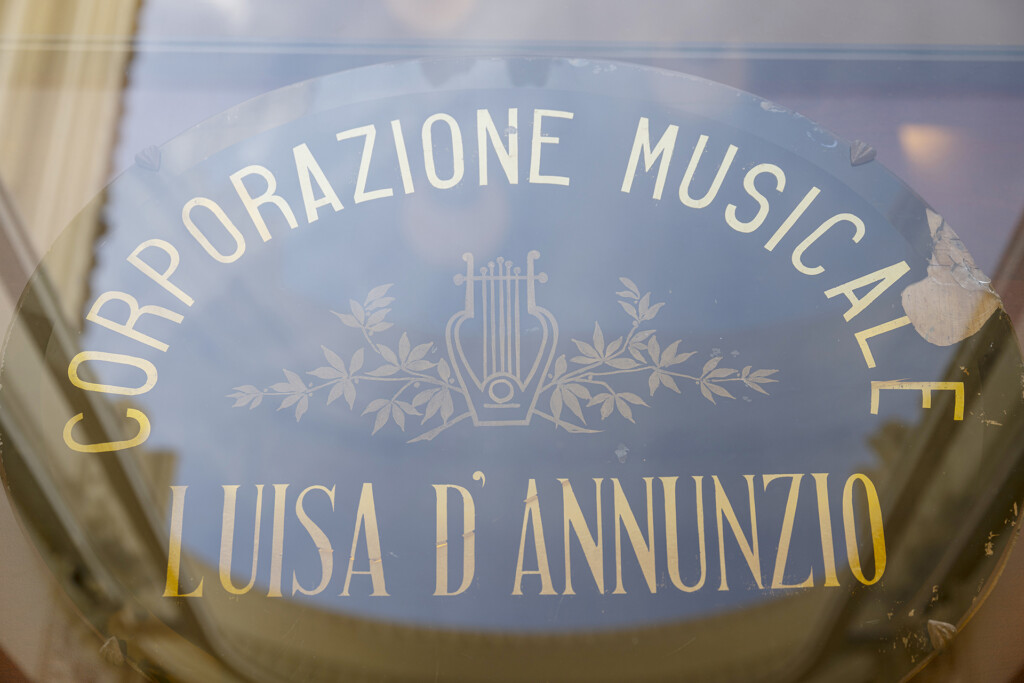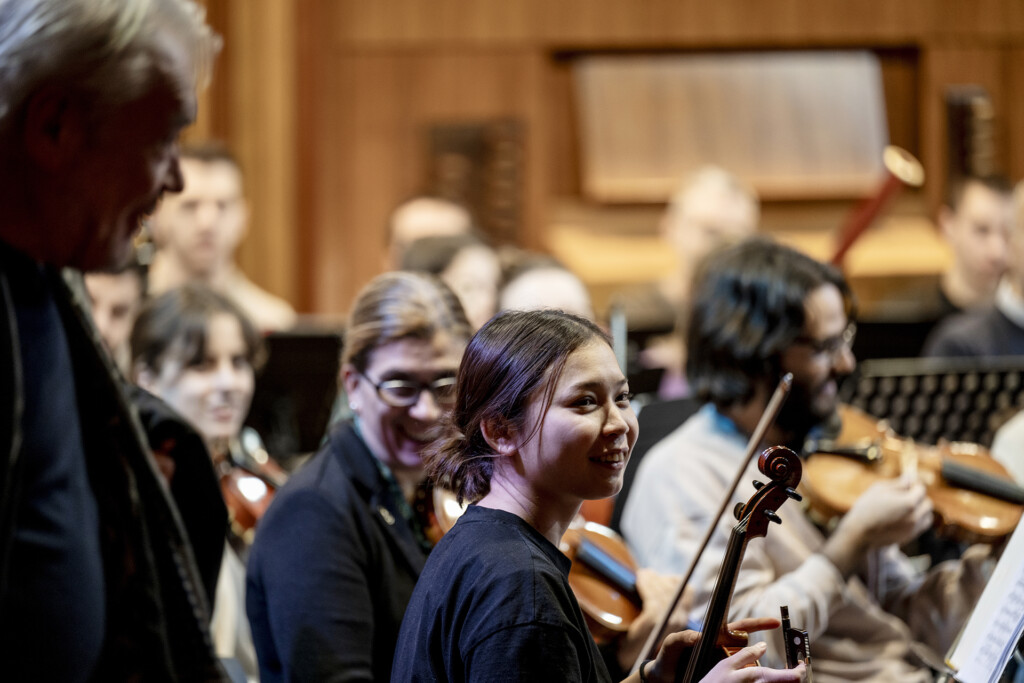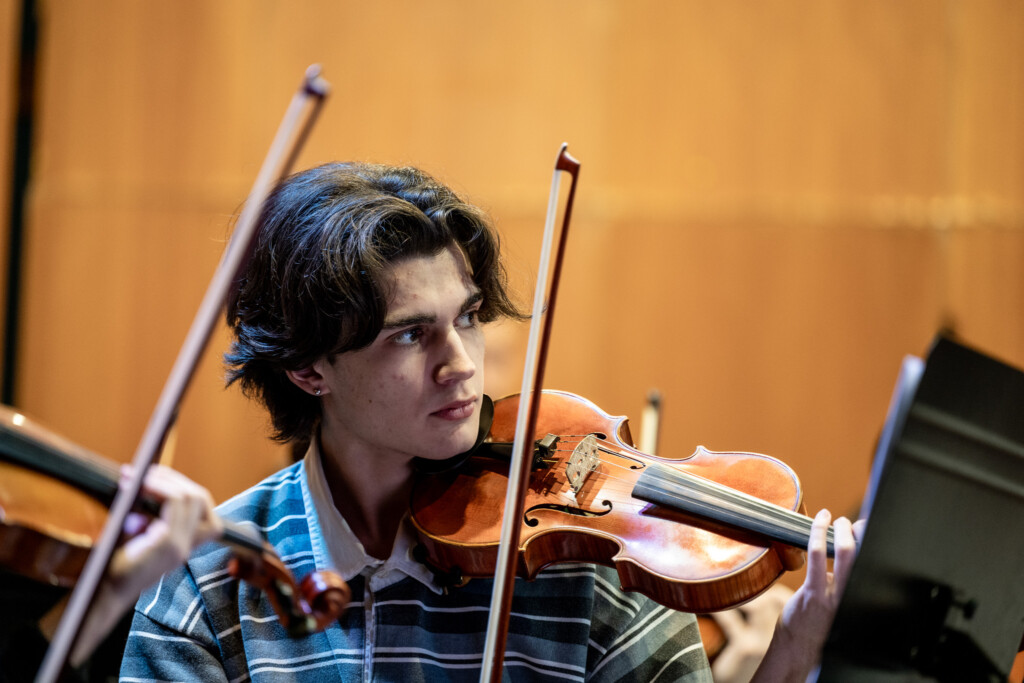
The Conservatoire “Luisa D’Annunzio”

Our courses and professional offer
The Luisa D’Annunzio Conservatoire offers a rich course catalogue from which several academic programmes are available for applicants:
- Trienni di Primo Livello: the equivalent of Bachelor degrees, (180 ECTS credits) these programmes last 3 academic years, i.e. 6 semesters, (EQF 6 Programme; level ISCED 6 according to International Standard Classification of Education);
- Bienni di Secondo Livello: the equivalent of Master degrees (120 ECTS credits) these programmes last 2 academic years, i.2. 4 semesters (EQF 7 Programme; level ISCED 7 according to International Standard Classification of Education);
- Corsi Formazione Docenti, the equivalent of Postgraduate Certificate of Education (PGCE) for Music Teaching in Secondary School.
- Corsi Singoli/ Single Courses
Voice and Musical Theatre

Education for Music Teaching and Musicology

New Technologies and Musical Languages

String Instruments

Wind Instruments

Keyboard Instruments and Percussion

Music Theory, Analysis, Composition and Conducting

Ensemble Music

Music Therapy School

Our Production Teams and Programmes encourage students to experience the professional world performing alone and/or in chamber, orchestral and ensemble formations for public concerts, often also with the cooperation of teachers and the involvement of musicians who are regularly invited for master classes and seminars. We also cooperate with concert seasons in Pescara and in local theatres and music halls as well as promoting virtual music cooperation through the Internet with partner institutions. Among our latest operatic productions, there are D. Cimarosa, Il matrimonio segreto and G. Puccini, Suor Angelica run by our Department of Voice and Musical Theatre.
We encourage composition students of the conservatoire providing them with the opportunity to hear their pieces performed by our ensembles and orchestra.
Master Classes and seminars

Prizes and scholarships

Electives Bachelor's Degree

Electives for Master's degrees

Until 30 August 2024, you can submit your pre-registration application on the portal UNIVERSITALY
GENERAL RULES FOR FOREIGN STUDENTS
Foreign students, European and non-European, are also admitted to Bachelor’s and Master’s degree courses:
Non-European candidates residing abroad are admitted to the enrolment in the Conservatoire, depending on the number of enrolments to Bachelor and Master degree courses, which is communicated yearly by the Conservatoire to the Ministry for Education, University and Research and which is published on the sites: https://www.universitaly.it/studenti-stranieri
A pre-enrolment form can be submitted by those who hold:
- a school-leaving certificate (such as A level or equivalent) which is useful for university entrance in the country where they got it.
- a Bachelor degree which is useful to be admitted to a Master degree in the country where they got it.
For general rules, requisites, modalities of pre-enrolments and the calendar of deadlines, see: http://www.studiare-in-italia.it/
Candidates from the European Union, wherever they reside and their non-European equivalent and/or candidates regularly staying in Italy (see article 39, paragraph 5, Legislative Decree n 286 of 25 July 1998, as modified by article 26, Act 30 July 2002 n. 189 “Changes to rules about immigration and asylum”) can participate in the admission exams for the Conservatoire without any limit in number.
According to the Protocol of the Ministry for Education, University and Research, of the Ministry for Foreign Affairs and of the Ministry for Education n. 7802 of 24 March 2014 “Rules for foreign students university entrance”, the following kinds of candidates are put on the same level as EU students:
- citizens from the following countries: Vatican City, Norway, Iceland, Liechtenstein, Switzerland, Republic of San Marino, even if holding a study certificate released by a foreign country.
- the following kinds of candidates:
- political refugees and holders of subsidiary protection.
- members of staff working for the foreign diplomatic missions and for International Organizations which are based in Italy – who are accredited to Italy or the Holy See – and their dependent family members, insofar as spouses and children.
- non-EU citizens legally staying in Italy according to article 26, Act 30 July 2002, n. 189, holders of a permit to stay or a UE permit to stay for long-term residents for: a) subordinate work, b) self-employment, c) family reasons d) political asylum, e) humanitarian asylum, f) religious reasons.
- non-EU citizens regularly staying in Italy for at least a year and holding a secondary-school certificate obtained in Italy.
- non-UE citizens, residing everywhere, holding a secondary-school certificate obtained in Italian schools abroad or in foreign schools or international schools which are based in Italy or abroad and regulated by bilateral agreements or special rules for the recognition of academic qualification and who satisfy the general requisites required for study purposes.
Taxes and fees for foreign students

BACHELOR DEGREE COURSES AND MASTER DEGREE COURSES: ADMISSIONS


The Erasmus+ Charter enables students, teachers, and staff of the Conservatoire to participate in the funded Erasmus+ activities. In addition to mobility measures for students and teachers, the “L. D’Annunzio” Conservatoire also carries out cooperation projects with renowned international partner universities.
The following activities are funded through ERASMUS+:
• Study abroad for students (SMS)
• Internship abroad for students and graduates (SMP)
• Teachers mobility (STA)
• Staff mobility (STT)
ERASMUS CODE: I PESCARA01
OID: E10046627
ERASMUS Charter 2021-27

ERASMUS Statement on Higher Education Policy

TRAINEESHIP at Pescara Conservatoire

ECTS European Credit Transfer and Accumulation System
“L. D’Annunzio” Conservatoire of Music operates under the ECTS system. Information available on the website of the European Commission: http://ec.europa.eu/education/ects/users-guide/glossary_en.htm#european-credit-transfer-and-accumulation-system
Extent
The extent refers to a number of credits allocated to each study module and study unit. The “L. D’Annunzio” Conservatoire of Music uses ECTS credits. 1 ECTS equals approximately 25 hours of course work, including the total workload required to complete the course: lectures, workshops, exams, independent study etc.
1 academic year = 60 ECTS = 1,300 hours
1 semester = 30 ECTS = 650 hours
The total number of completed credits is indicated on the transcript.
“L. D’Annunzio” Conservatoire of Music welcomes teachers and staff from partner institutions as well as experts from companies participating in a teaching or training mobility within the framework of the Erasmus+ programme!
In order to carry out a mobility, your sending institution must have a valid Erasmus+ inter-institutional agreement with us. If this is not the case, the International Office is open to discuss with your institution to establish an Erasmus+ agreement before your mobility.
If you are interested in doing an Erasmus+ teaching or Erasmus+ training mobility (e.g. individual job shadowing, workshops, training stay) at the Pescara Conservatoire of Music, please contact the Erasmus+ office of your home university to check if a bilateral Erasmus agreement exists. Please note that the grant for travel and accommodation costs is exclusively administered by your home university.
Please send an email to our Erasmus+ office with the following information:
- Curriculum vitae
- Short description of the planned activity or project
- Preferred period and duration of the planned stay
Please do not hesitate to contact us any time. We are happy to support you!
OINTERNAL STUDENTS INTERESTED IN AN OUTGOING MOBILITY PROGRAMME
The Erasmus+ KA1 Study Programme (SMS) and Internship Programme (SMP) is an EU-sponsored mobility programme that allows you to spend between two and twelve months at a foreign Conservatoire.
During your stay abroad, you can attend courses, sit exams and obtain recognition from your home institution, or prepare a thesis or carry out an internship (within 1 year of the final exam).
As support for the costs associated with the stay abroad, the programme offers a financial contribution, which varies depending on the country of destination.
With Erasmus+ student status comes the guarantee of exemption from paying tuition fees at the host institution (but not those of the home institution) and the right to use the same services that the host institution offers its students.
List of student mobility opportunities:
Study stay at a partner university (max. 1-2 semesters)
Internship abroad for students or graduates
BIP – Blended intensive programme
Mixed short-term mobility with virtual component for some students
International mobility (extra EU)
INTERNAL LECTURERS AND STAFF INTERESTED IN AN OUTGOING MOBILITY PROGRAMME
Within the framework of the Erasmus+ Programme, the Conservatoire promotes the outgoing mobility of the Institute’s teaching and non-teaching staff abroad, with the aim of pursuing the transfer of skills, the acquisition of practical abilities and the learning of good practices to be followed in their own working environment.
Types of mobility for Teachers and/or Staff
- Teacher mobility for teaching activities (STA)
- Staff/Teaching Staff Mobility (STT)
The mobility activity, depending on the type, may take place in an HEI and/or public/private organisation located in an EU Member State or in a Third Country associated to the Programme. Specifically:
An HEI from a Programme Country holding an Erasmus Charter (ECHE);
Any public or private organisation from a Programme Country active in the labour market or in areas such as education, training and youth.
MOBILITY FOR TEACHING ACTIVITIES
Erasmus+ allows the Conservatoire’s teachers to carry out a period of teaching activity at a higher education institution in one of the countries participating in the Programme which has concluded a bilateral agreement with the Conservatoire.
The purpose of the activity is to transfer skills, to contribute to the enrichment of curricula, and to offer students and non-mobile teachers opportunities to compare different teaching methods. Once the lesson plan has been agreed upon, the teaching hours held by the mobility staff will be integrated into those provided by the host institution.
STA mobility generally lasts a minimum of 2 days and a maximum of 5 days. In any case, the teaching programme must provide for a minimum of 8 hours of teaching per week (or for each period of stay of less than one week).
MOBILITY FOR TRAINEESHIP ACTIVITIES (STT)
Within the framework of the Erasmus+ Programme, it enables staff and teaching staff to benefit from a period of training at Higher Education Institutions holding an ECHE and/or at companies located in one of the countries participating in the Programme.
STT mobility lasts a minimum of 2 days and a maximum of 5 days.
Prerequisite for the award of each grant is the presentation of a work plan agreed between the Conservatoire and the host Institute and/or enterprise.
B.I.P. “House of Europe International Song-writing project”
The Conservatoire of Pescara is realising a Blended Learning Intensive Programme (BIP) called “House of Europe International Song-writing project”. This innovative Erasmus+ mobility format, developed in partnership with five international universities, merges periods of virtual learning with physical group mobility ranging from 5 to 30 days. The BIP, which necessitates the participation of at least three higher education institutions from three different Erasmus programme countries and a minimum of 15 students, fosters novel teaching and learning methodologies and enables students to earn a minimum of 3 ECTS.
Since 2015, Europe has been grappling with a surge in immigration, primarily due to conflicts in the Middle East. This has posed a significant challenge: how to accommodate and assist immigrants and refugees while maintaining human rights. The House of Europe International Song-writing Project seeks to address this by fostering collaboration between music students from various European countries and migrant musicians, thereby opening borders and infusing a human and artistic perspective into the multicultural society through music.
The project encourages participants to delve into their cultural backgrounds and collaborate on both a personal and artistic level. The innovative mobility curriculum, which revolves around these themes, is jointly developed, organized, and executed in collaboration with partner universities: Metropolia University of Applied Sciences in Helsinki, HKU Utrechts Conservatorium, Vienna Music Institute, Centro Superior Musica Creativa in Madrid, and the University of Tartu – Viljandi Culture Academy.
Furthermore, the ongoing coronavirus crisis has had a profound impact on both the educational and creative sectors, leading to international travel restrictions, limited social interaction, cancelled live events, and health issues. The House of Europe International Song-writing Project addresses these challenges by integrating digital teaching and teamwork with the latest digital music production and communication tools, participatory song-writing workshops, and live event production.
In the summer semester of 2024, the House of Europe International Song-writing Project will be held for the sixth time. Following successful projects in Helsinki, Utrecht, Pescara, Vienna, and Madrid, the next stop is Estonia, at our partner school, the University of Tartu, Viljandi Culture Academy.
Working With Music+ (WWM+) is a postgraduate internship mobility project to which students of the WWM+ Consortium’s partner Music Conservatories can apply. The Pescara Conservatoire has been a partner of the WWM+ Consortium since 2014.
To participate, it is necessary to wait for the publication of the specific call for applications:
- The application must be submitted during the final year of study
- The student must be selected for the mobility before graduation.
- The placement must be carried out after graduation and must be completed within 12 months of graduation.
- Students who have already carried out Erasmus mobility may also apply.
For further information please consult the website www.workingwithmusic.net or contact the project contact person M° Stefania Franchini at the following e-mail address: stefania.franchini@conservatoriopescara.it
Erasmus partner institutions

Extra EU Partners





